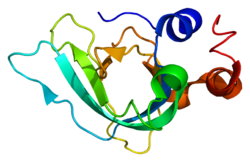The LysRS-Ap4A-MITF signaling pathway was first discovered in mast cells, in which , the MAPK pathway is activated upon allergen stimulation. Lysyl-tRNA synthetase (LysRS), which normally resides in the multisynthetase complex with other tRNA sythetases, is phosphorylated on Serine 207 in a MAPK-dependent manner.[30] This phosphorylation causes LysRS to change its conformation, detach from the complex and translocate into the nucleus, where it associates with the MITF-HINT1 inhibitory complex. The conformational change switches LysRS activity from aminoacylation of Lysine tRNA to diadenosine tetraphosphate (Ap4A) production. Ap4A binds to HINT1, which releases MITF from the inhibitory complex, allowing it to transcribe its target genes.[31] Activation of the LysRS-Ap4A-MITF signaling pathway by isoproterenol has been confirmed in cardiomyocytes, where MITF is a major regulator of cardiac growth and hypertrophy.[32][33](wikipedia)
Not only it gives Hypertrophy but epidermolysis goes through this intergrin, it participates in the ERBB pathways. Mark my word this is are critical pathways in pancreatic cancers.
MTIF GIVES YOU MOTIVES TO GO AFTER IT!
MAKING THE ERBIN A PLAUSIBLE TARGET.
MAKING ALSO A STRONGER CASE THAT MEMBRANE CYTOSKELETON SHOULD BE A GOOD TARGET BECAUSE OF THE WAY IT DRIVES ITS PATHWAY NOT THROUGH THE CYTOSOL( ALTHOUGH THERE IS A SECONDARY RAS/MAPK STIMULATION,) BUT THE PATHWAY HERE IS THROUGH THE RETICULUM ENDOTHELIUM DIRECTLY TO THE NUCLEUS! CONCEPTUALLY, AN ANTIBODY TO LAMININ ATTACHED TO A SUBUNIT OF A LIPOLYTIC COMPOUND SHOULD HAVE A THERAPEUTIC OR CHEMICAL EFFECT AT THIS LEVEL. AN INTERESTING APPROACH. CHANCES ARE IT MAY ALSO HAVE A STRONG IMPACT ON THE WNT-PATHWAY WHICH TRAVEL CLOSE BY AND IS IMPORTANT IN BREAST CANCER!
MTA-1: THIS IS A REAL OPPORTUNITY
Here the cell stopped fooling around trying to lie to you. Here the cell says to you this is one of my way to metastatasize. yes this is my gene to mestastasize and I will work like any CBF like molecule by attaching to DNA and make me protein that will have me spread like wild fire! And by the way I will use a growth hormone like Estrogen. no kidding around
"MTA1 has been shown to interact with HDAC1,[4][5] Histone deacetylase 2,[4][6][5] MTA2,[4] Estrogen receptor alpha[7][5] and MNAT1.[8] MTA1 has also been shown to inhibit SMAD7 at the transcriptional level[9]"
IT DOES NEED TGF TO WORK, TGF IS FOR LOCAL GROWTH ANYWAY THAT WHY IT BLOCKS THE SMAD.
SPINT2
Mutation at SPINT2 leads to significant Malignant Ascites and peritoneal invasion, SPINT 2 is a suppressor of this phenomena. On the Intestinal membrane deficiency of SPINT2 leads to sodium induced/containing diarrhea. This is also true in Ovarian cancer or peritoneal based tumors. Targeting this is better then trying Avastin, a blind approach when it comes to effusions management.
MMP11
A metalloproteiase, aimed at breaking down extracellular matrix and be on the move. Targeting MMP for cancer has proven futile. The cell is not stupid, it does not put out things that is going to hunt it! It first builds a strong inhibitor to metalloproteinases. In fact lack of inhibitors has been recognized as the main pathogenesis of TTP. With the ADAMs being the integrins involved! and next is that Inhibitor which is of course expressed in pancreatic cancer.
TIMP1
TIMP1
From Wikipedia, the free encyclopedia
| TIMP metallopeptidase inhibitor 1 | |||||||||||
|---|---|---|---|---|---|---|---|---|---|---|---|
 PDB rendering based on 1d2b. |
|||||||||||
|
|||||||||||
| Identifiers | |||||||||||
| Symbols | TIMP1; CLGI; EPA; EPO; HCI; TIMP | ||||||||||
| External IDs | OMIM: 305370 MGI: 98752 HomoloGene: 36321 GeneCards: TIMP1 Gene | ||||||||||
|
|||||||||||
| RNA expression pattern | |||||||||||
 |
|||||||||||
| More reference expression data | |||||||||||
| Orthologs | |||||||||||
| Species | Human | Mouse | |||||||||
| Entrez | 7076 | 21857 | |||||||||
| Ensembl | ENSG00000102265 | ENSMUSG00000001131 | |||||||||
| UniProt | P01033 | P12032 | |||||||||
| RefSeq (mRNA) | NM_003254 | NM_001044384 | |||||||||
| RefSeq (protein) | NP_003245 | NP_001037849 | |||||||||
| Location (UCSC) | Chr X: 47.44 – 47.45 Mb |
Chr X: 20.87 – 20.87 Mb |
|||||||||
| PubMed search | [1] | [2] | |||||||||
This protein a member of the TIMP family. The glycoprotein is a natural inhibitor of the matrix metalloproteinases (MMPs), a group of peptidases involved in degradation of the extracellular matrix. In addition to its inhibitory role against most of the known MMPs, the encoded protein is able to promote cell proliferation in a wide range of cell types, and may also have an anti-apoptotic function.
==============
PRKCA see PRKCG
Here Phorbol esters, diacylglycerol, and calcium become important for the cell performance of various functions. Did I mention few targets, I truly believe I did!
CDH1 The Cadherin by excellence, not only important as adhesion molecule and role in metastasis. Its role is amplified by what else anchors here such as Vinculin, and others molecules such as Plakoglobins, amplifying the role. Remember even Cytochrome C is anchored at the mitochondrial membrane and its release leads to apoptosis!
The anchors are legitimate targets therefore, and brings to mind NACA1 in the anchoring to Histone deacetyl transferase (SEE OUR LEUKEMIA SECTION) CDH13 THAT'S ANOTHER BALL GAME ALL TOGETHER. THE CELL TWEACKS SOMETHING AND IT IS ANOTHER BALL GAME ALL TOGETHER!
==========================